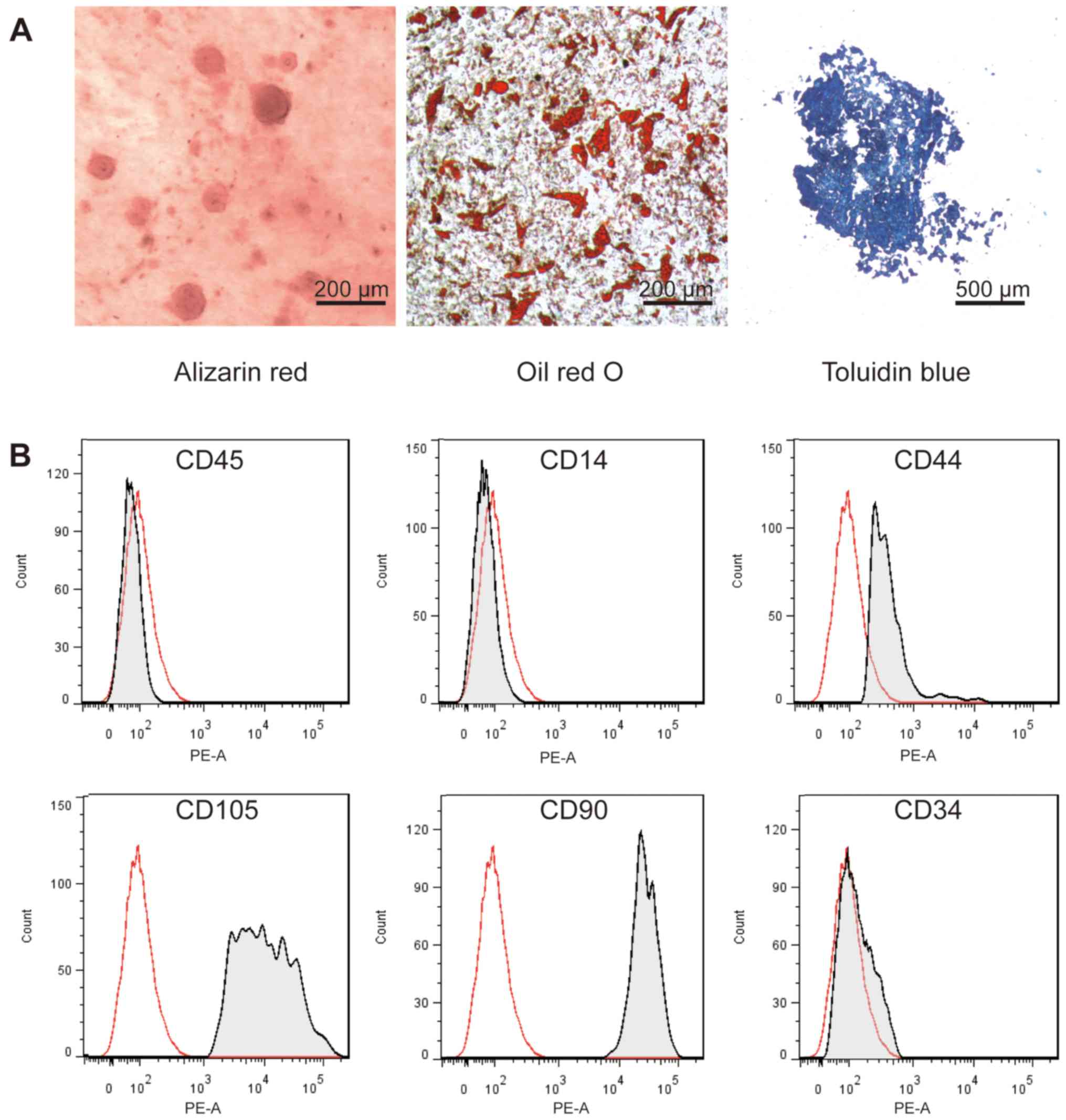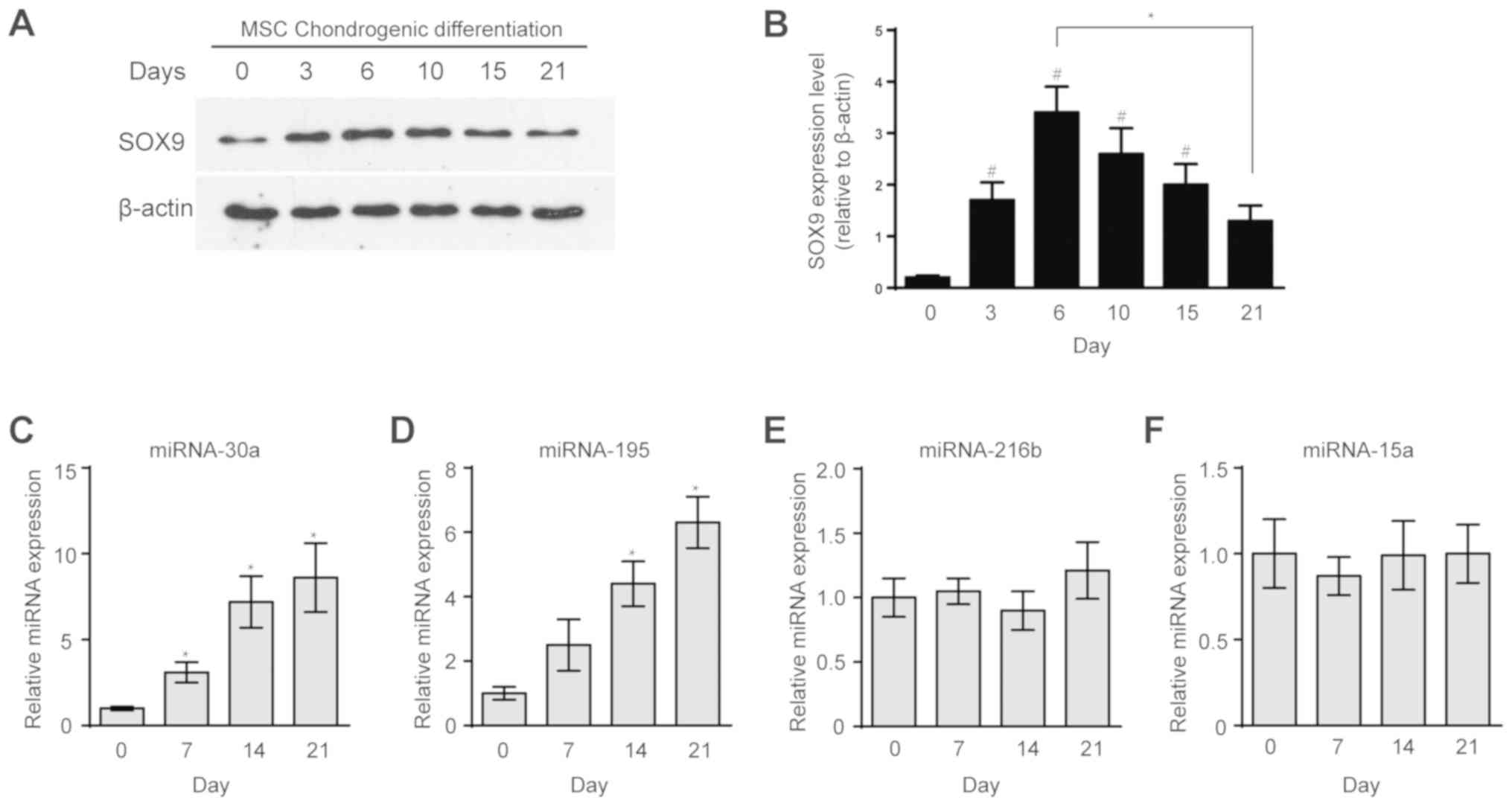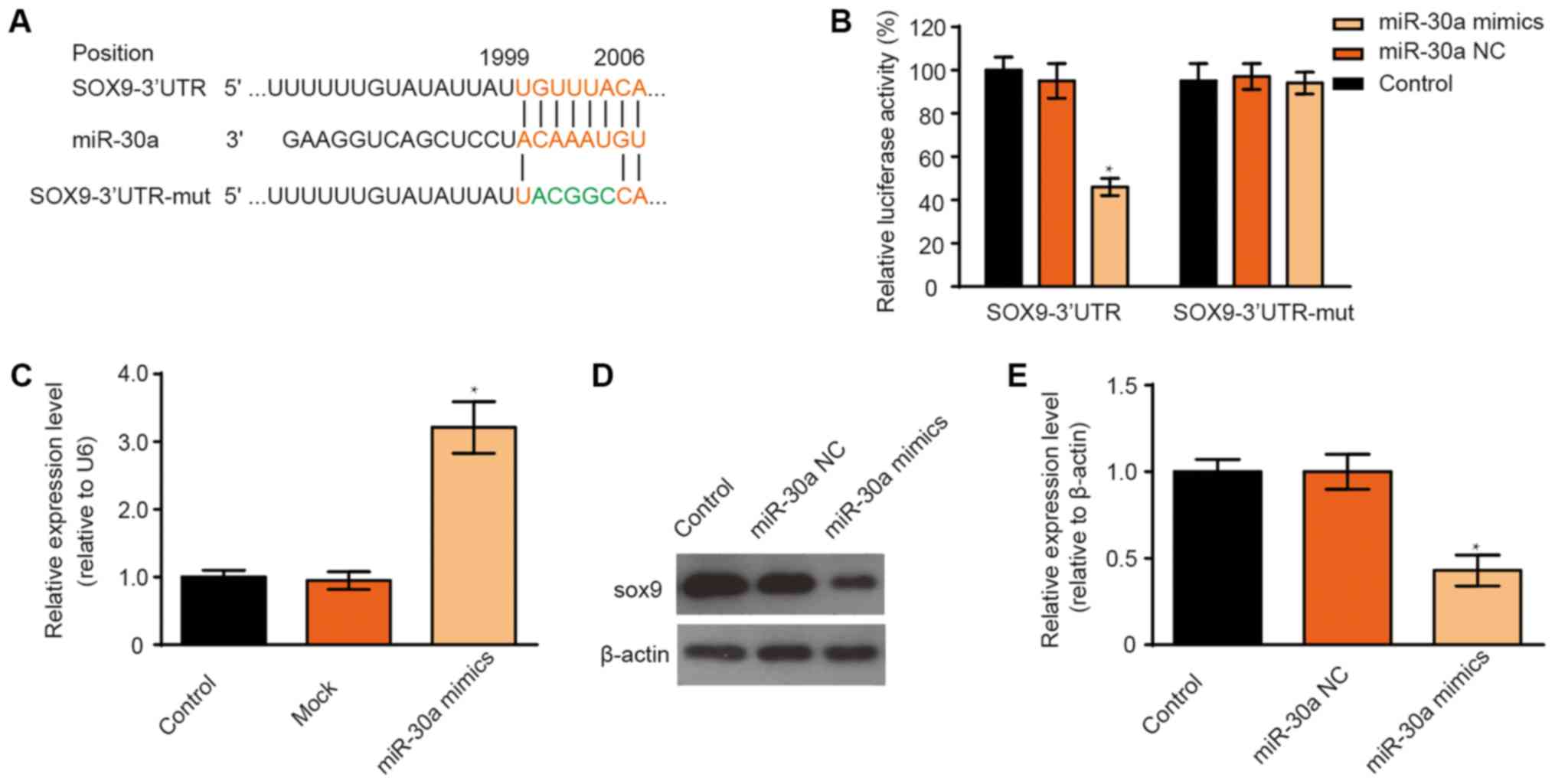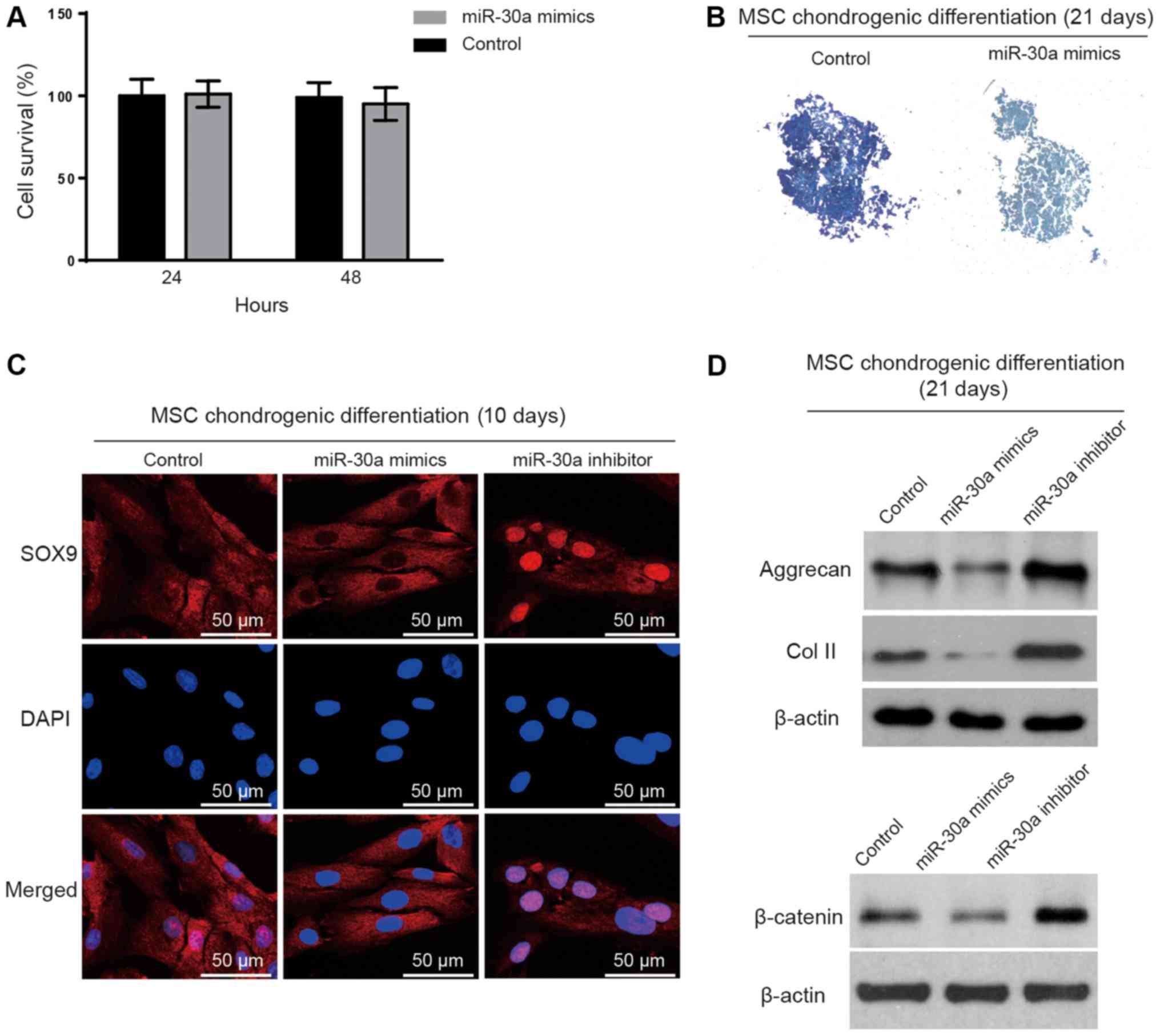|
1
|
Loeser RF, Collins JA and Diekman BO:
Ageing and the pathogenesis of osteoarthritis. Nat Rev Rheumatol.
12:412–420. 2016. View Article : Google Scholar : PubMed/NCBI
|
|
2
|
Makris EA, Gomoll AH, Malizos KN, Hu JC
and Athanasiou KA: Repair and tissue engineering techniques for
articular cartilage. Nat Rev Rheumatol. 11:21–34. 2015. View Article : Google Scholar : PubMed/NCBI
|
|
3
|
Roos EM and Arden NK: Strategies for the
prevention of knee osteoarthritis. Nat Rev Rheumatol. 12:92–101.
2016. View Article : Google Scholar : PubMed/NCBI
|
|
4
|
Bhattacharjee M, Coburn J, Centola M,
Murab S, Barbero A, Kaplan DL, Martin I and Ghosh S: Tissue
engineering strategies to study cartilage development, degeneration
and regeneration. Adv Drug Deliv Rev. 84:107–122. 2015. View Article : Google Scholar : PubMed/NCBI
|
|
5
|
Evans CH and Huard J: Gene therapy
approaches to regenerating the musculoskeletal system. Nat Rev
Rheumatol. 11:234–242. 2015. View Article : Google Scholar : PubMed/NCBI
|
|
6
|
Craft AM, Rockel JS, Nartiss Y, Kandel RA,
Alman BA and Keller GM: Generation of articular chondrocytes from
human pluripotent stem cells. Nat Biotechnol. 33:638–645. 2015.
View Article : Google Scholar : PubMed/NCBI
|
|
7
|
Xia H, Liang C, Luo P, Huang J, He J, Wang
Z, Cao X, Peng C and Wu S: Pericellular collagen I coating for
enhanced homing and chondrogenic differentiation of mesenchymal
stem cells in direct intra-articular injection. Stem Cell Res Ther.
9:1742018. View Article : Google Scholar : PubMed/NCBI
|
|
8
|
Grayson WL, Bunnell BA, Martin E, Frazier
T, Hung BP and Gimble JM: Stromal cells and stem cells in clinical
bone regeneration. Nat Rev Endocrinol. 11:140–150. 2015. View Article : Google Scholar : PubMed/NCBI
|
|
9
|
Visweswaran M, Pohl S, Arfuso F, Newsholme
P, Dilley R, Pervaiz S and Dharmarajan A: Multi-lineage
differentiation of mesenchymal stem cells-To Wnt, or not Wnt. Int J
Biochem Cell Biol. 68:139–147. 2015. View Article : Google Scholar : PubMed/NCBI
|
|
10
|
Jiang X, Huang X, Jiang T, Zheng L, Zhao J
and Zhang X: The role of Sox9 in collagen hydrogel-mediated
chondrogenic differentiation of adult mesenchymal stem cells
(MSCs). Biomater Sci. 6:1556–1568. 2018. View Article : Google Scholar : PubMed/NCBI
|
|
11
|
Loebel C, Czekanska EM, Bruderer M,
Salzmann G, Alini M and Stoddart MJ: In vitro osteogenic potential
of human mesenchymal stem cells is predicted by Runx2/Sox9 ratio.
Tissue Eng Part A. 21:115–123. 2015. View Article : Google Scholar : PubMed/NCBI
|
|
12
|
Ono N, Ono W, Nagasawa T and Kronenberg
HM: A subset of chondrogenic cells provides early mesenchymal
progenitors in growing bones. Nat Cell Biol. 16:1157–1167. 2014.
View Article : Google Scholar : PubMed/NCBI
|
|
13
|
Shivdasani RA: MicroRNAs: Regulators of
gene expression and cell differentiation. Blood. 108:3646–3653.
2006. View Article : Google Scholar : PubMed/NCBI
|
|
14
|
Treiber T, Treiber N and Meister G:
Regulation of microRNA biogenesis and its crosstalk with other
cellular pathways. Nat Rev Mol Cell Biol. 20:5–20. 2019. View Article : Google Scholar : PubMed/NCBI
|
|
15
|
Wa Q, He P, Huang S, Zuo J, Li X, Zhu J,
Hong S, Lv G, Cai D, Xu D, et al: miR-30b regulates chondrogenic
differentiation of mouse embryo-derived stem cells by targeting
SOX9. Exp Ther Med. 14:6131–6137. 2017.PubMed/NCBI
|
|
16
|
Anderson BA and McAlinden A: miR-483
targets SMAD4 to suppress chondrogenic differentiation of human
mesenchymal stem cells. J Orthop Res. 35:2369–2377. 2017.
View Article : Google Scholar : PubMed/NCBI
|
|
17
|
Lee S, Yoon DS, Paik S, Lee KM, Jang Y and
Lee JW: microRNA-495 inhibits chondrogenic differentiation in human
mesenchymal stem cells by targeting Sox9. Stem Cells Dev.
23:1798–1808. 2014. View Article : Google Scholar : PubMed/NCBI
|
|
18
|
Moutinho C and Esteller M: MicroRNAs and
epigenetics. Adv Cancer Res. 135:189–220. 2017. View Article : Google Scholar : PubMed/NCBI
|
|
19
|
van Meurs JB, Boer CG, Lopez-Delgado L and
Riancho JA: Role of epigenomics in bone and cartilage disease. J
Bone Miner Res. 34:215–230. 2019. View Article : Google Scholar : PubMed/NCBI
|
|
20
|
Chang T, Xie J, Li H, Li D, Liu P and Hu
Y: MicroRNA-30a promotes extracellular matrix degradation in
articular cartilage via downregulation of Sox9. Cell Prolif.
49:207–218. 2016. View Article : Google Scholar : PubMed/NCBI
|
|
21
|
Almeida MI, Silva AM, Vasconcelos DM,
Almeida CR, Caires H, Pinto MT, Calin GA, Santos SG and Barbosa MA:
miR-195 in human primary mesenchymal stromal/stem cells regulates
proliferation, osteogenesis and paracrine effect on angiogenesis.
Oncotarget. 7:7–22. 2016. View Article : Google Scholar : PubMed/NCBI
|
|
22
|
Liu S, Dong H, Dai H, Liu D and Wang Z:
MicroRNA-216b regulated proliferation and invasion of non-small
cell lung cancer by targeting SOX9. Oncol Lett. 15:10077–10083.
2018.PubMed/NCBI
|
|
23
|
Liu XJ, Bai XG, Teng YL, Song L, Lu N and
Yang RQ: miRNA-15a-5p regulates VEGFA in endometrial mesenchymal
stem cells and contributes to the pathogenesis of endometriosis.
Eur Rev Med Pharmacol Sci. 20:3319–3326. 2016.PubMed/NCBI
|
|
24
|
Wang YJ, Zhang HQ, Han HL, Zou YY, Gao QL
and Yang GT: Taxifolin enhances osteogenic differentiation of human
bone marrow mesenchymal stem cells partially via NF-κB pathway.
Biochem Biophys Res Commun. 490:36–43. 2017. View Article : Google Scholar : PubMed/NCBI
|
|
25
|
Livak KJ and Schmittgen TD: Analysis of
relative gene expression data using real-time quantitative PCR and
the 2(-Delta Delta C(T)) method. Methods. 25:402–408. 2001.
View Article : Google Scholar : PubMed/NCBI
|
|
26
|
Uder C, Bruckner S, Winkler S, Tautenhahn
HM and Christ B: Mammalian MSC from selected species: Features and
applications. Cytometry A. 93:32–49. 2018. View Article : Google Scholar : PubMed/NCBI
|
|
27
|
Zhao C, Jiang W, Zhou N, Liao J, Yang M,
Hu N, Liang X, Xu W, Chen H, Liu W, et al: Sox9 augments
BMP2-induced chondrogenic differentiation by downregulating Smad7
in mesenchymal stem cells (MSCs). Genes Dis. 4:229–239. 2017.
View Article : Google Scholar : PubMed/NCBI
|
|
28
|
Liao J, Hu N, Zhou N, Lin L, Zhao C, Yi S,
Fan T, Bao W, Liang X, Chen H, et al: Sox9 potentiates BMP2-induced
chondrogenic differentiation and inhibits BMP2-induced osteogenic
differentiation. PLoS One. 9:e890252014. View Article : Google Scholar : PubMed/NCBI
|
|
29
|
Almalki SG and Agrawal DK: Key
transcription factors in the differentiation of mesenchymal stem
cells. Differentiation. 92:41–51. 2016. View Article : Google Scholar : PubMed/NCBI
|
|
30
|
Chang M, Lin H, Fu H, Wang B, Han G and
Fan M: MicroRNA-195-5p regulates osteogenic differentiation of
periodontal ligament cells under mechanical loading. J Cell
Physiol. 232:3762–3774. 2017. View Article : Google Scholar : PubMed/NCBI
|
|
31
|
Eguchi T, Watanabe K, Hara ES, Ono M,
Kuboki T and Calderwood SK: OstemiR: A novel panel of microRNA
biomarkers in osteoblastic and osteocytic differentiation from
mesencymal stem cells. PLoS One. 8:e587962013. View Article : Google Scholar : PubMed/NCBI
|
|
32
|
Luo Y, Sinkeviciute D, He Y, Karsdal M,
Henrotin Y, Mobasheri A, Önnerfjord P and Bay-Jensen A: The minor
collagens in articular cartilage. Protein Cell. 8:560–572. 2017.
View Article : Google Scholar : PubMed/NCBI
|
|
33
|
Duan P and Bonewald LF: The role of the
wnt/β-catenin signaling pathway in formation and maintenance of
bone and teeth. Int J Biochem Cell Biol. 77:23–29. 2016. View Article : Google Scholar : PubMed/NCBI
|
|
34
|
Deng A, Zhang H, Hu M, Liu S, Wang Y, Gao
Q and Guo C: The inhibitory roles of Ihh downregulation on
chondrocyte growth and differentiation. Exp Ther Med. 15:789–794.
2018.PubMed/NCBI
|
|
35
|
Deng ZH, Li YS, Gao X, Lei GH and Huard J:
Bone morphogenetic proteins for articular cartilage regeneration.
Osteoarthritis Cartilage. 26:1153–1161. 2018. View Article : Google Scholar : PubMed/NCBI
|
|
36
|
Viswanathan C, Kulkarni R, Bopardikar A
and Ramdasi S: Significance of CD34 negative hematopoietic stem
cells and CD34 positive mesenchymal stem cells-A valuable dimension
to the current understanding. Curr Stem Cell Res Ther. 12:476–483.
2017. View Article : Google Scholar : PubMed/NCBI
|
|
37
|
Szade K, Zuba-Surma E, Rutkowski AJ,
Jozkowicz A and Dulak J: CD45-CD14+CD34+ murine bone marrow
low-adherent mesenchymal primitive cells preserve multilineage
differentiation potential in long-term in vitro culture. Mol Cells.
31:497–507. 2011. View Article : Google Scholar : PubMed/NCBI
|
|
38
|
Baptista LS, do Amaral RJ, Carias RB,
Aniceto M, Claudio-da-Silva C and Borojevic R: An alternative
method for the isolation of mesenchymal stromal cells derived from
lipoaspirate samples. Cytotherapy. 11:706–715. 2009. View Article : Google Scholar : PubMed/NCBI
|
|
39
|
Healy C, Uwanogho D and Sharpe PT:
Regulation and role of Sox9 in cartilage formation. Dev Dyn.
215:69–78. 1999. View Article : Google Scholar : PubMed/NCBI
|
|
40
|
Somoza RA, Welter JF, Correa D and Caplan
AI: Chondrogenic differentiation of mesenchymal stem cells:
Challenges and unfulfilled expectations. Tissue Eng Part B Rev.
20:596–608. 2014. View Article : Google Scholar : PubMed/NCBI
|
|
41
|
Barry F and Murphy M: Mesenchymal stem
cells in joint disease and repair. Nat Rev Rheumatol. 9:584–594.
2013. View Article : Google Scholar : PubMed/NCBI
|
|
42
|
Jo A, Denduluri S, Zhang B, Wang Z, Yin L,
Yan Z, Kang R, Shi LL, Mok J, Lee MJ and Haydon RC: The versatile
functions of Sox9 in development, stem cells, and human diseases.
Genes Dis. 1:149–161. 2014. View Article : Google Scholar : PubMed/NCBI
|
|
43
|
Shim J and Nam JW: The expression and
functional roles of microRNAs in stem cell differentiation. BMB
Rep. 49:3–10. 2016. View Article : Google Scholar : PubMed/NCBI
|
|
44
|
Martin EC, Qureshi AT, Llamas CB, Burow
ME, King AG, Lee OC, Dasa V, Freitas MA, Forsberg JA, Elster EA, et
al: Mirna biogenesis pathway is differentially regulated during
adipose derived stromal/stem cell differentiation. Adipocyte.
7:96–105. 2018.PubMed/NCBI
|
|
45
|
Zeng ZL, Lin XL, Tan LL, Liu YM, Qu K and
Wang Z: MicroRNAs: Important regulators of induced pluripotent stem
cell generation and differentiation. Stem Cell Rev. 14:71–81. 2018.
View Article : Google Scholar
|
|
46
|
Ran X, Xiao CH, Xiang GM and Ran XZ:
Regulation of embryonic stem cell self-renewal and differentiation
by MicroRNAs. Cell Reprogramm. 19:150–158. 2017. View Article : Google Scholar
|
|
47
|
Papaioannou G, Mirzamohammadi F, Lisse TS,
Nishimori S, Wein MN and Kobayashi T: MicroRNA-140 provides
robustness to the regulation of hypertrophic chondrocyte
differentiation by the PTHrP-HDAC4 pathway. J Bone Miner Res.
30:1044–1052. 2015. View Article : Google Scholar : PubMed/NCBI
|
|
48
|
Zhang Y, Huang X and Yuan Y: MicroRNA-410
promotes chondrogenic differentiation of human bone marrow
mesenchymal stem cells through down-regulating Wnt3a. Am J Transl
Res. 9:136–145. 2017.PubMed/NCBI
|
|
49
|
Suchorska WM, Augustyniak E, Richter M and
Trzeciak T: Gene expression profile in human induced pluripotent
stem cells: Chondrogenic differentiation in vitro, part A.
Mol Med Rep. 15:2387–2401. 2017. View Article : Google Scholar : PubMed/NCBI
|
|
50
|
Oh CD, Yasuda H, Zhao W, Henry SP, Zhang
Z, Xue M, de Crombrugghe B and Chen D: SOX9 directly regulates
CTGF/CCN2 transcription in growth plate chondrocytes and in nucleus
pulposus cells of intervertebral disc. Sci Rep. 6:299162016.
View Article : Google Scholar : PubMed/NCBI
|
|
51
|
Maciejak A, Kostarska-Srokosz E, Gierlak
W, Dluzniewski M, Kuch M, Marchel M, Opolski G, Kiliszek M, Matlak
K, Dobrzycki S, et al: Circulating miR-30a-5p as a prognostic
biomarker of left ventricular dysfunction after acute myocardial
infarction. Sci Rep. 8:98832018. View Article : Google Scholar : PubMed/NCBI
|
|
52
|
Zhang C, Ma X, Du J, Yao Z, Shi T, Ai Q,
Chen X, Zhang Z, Zhang X and Yao X: MicroRNA-30a as a prognostic
factor in urothelial carcinoma of bladder inhibits cellular
malignancy by antagonising Notch1. BJU Int. 118:578–589. 2016.
View Article : Google Scholar : PubMed/NCBI
|
|
53
|
Perugorria MJ, Olaizola P, Labiano I,
Esparza-Baquer A, Marzioni M, Marin JJG, Bujanda L and Banales JM:
Wnt-β-catenin signalling in liver development, health and disease.
Nat Rev Gastroenterol Hepatol. 16:121–136. 2019. View Article : Google Scholar : PubMed/NCBI
|


















